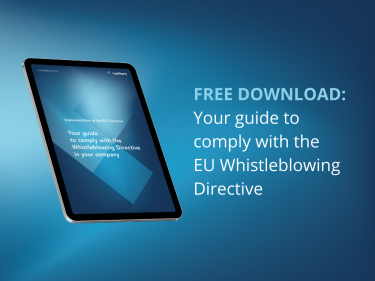The whistleblowing report in the context of the EU Whistleblowing Directive
The whistleblowing report is, in addition to the “whistleblower”, the central component of a whistleblowing system. But how is such a report defined and what kind of reports are covered by the EU Whistleblowing Directive? We want to answer these questions in part 6 of our Whistleblowing Basics series.
First, a definition: What is a report?
If you look in the Duden dictionary, the term “report” can basically be understood as “advice, tip, hint”, but also as a “hint or indicative sign for something”. That is probably quite obvious to you. But the latter definition is the one that applies to a report under the EU Whistleblowing Directive: a “report” is an indication of a breach of law or of ethics in a company. Under the Directive, for example, employees should be able to make a report either in writing or orally. The whistleblower should also be allowed to meet physically at his or her request to communicate the report.
It is also possible to delimit what a report should definitely not be: namely groundless accusations or blackening of colleagues in order to harm them. Statistics show, however, that such “abusive” reports represent only a marginal share and are not increasing due to the introduction of digital whistleblowing systems.
As soon as you receive a report, you should first assume that it is an actual observation of a violation and that the whistleblower has made this report in good conscience or with confidence that his observations are true.
Reports in accordance with the EU Whistleblowing Directive
Let’s move on to the second part: What types of reports are covered by the EU Whistleblowing Directive? According to the EU Whistleblowing Directive, breaches of the following requirements should be reported:
- breaches of consumer protection
- breaches of environmental protection
- violations against the financial interests of the Union
- breaches of competition law; and
- breaches of tax and money laundering law.
These are requirements of EU law. Each country can expand the scope of the infringements to be reported in its national law. It is quite possible and, based on current information (as of February 2022), also likely that the German legislator will include violations of German law in the Whistleblower Protection Act. In principle, you can therefore assume that in future all reports on violations of EU law and national law will fall under the whistleblower protection. In addition, you as a company have the scope to also investigate ethical violations and violations of your company’s own code of conduct. This gives you the opportunity to take preventive action before a violation of law occurs and to avert further damage.
Dealing with reports: A report is received - what now?
See reports for what they are: a smoke signal, a sign of violations or problems in your company. This is an opportunity for your company to first address the suspicion internally, investigate and find a solution before the violation leads to far-reaching consequences for your company. Remember that reports can also reveal internal problems within the company. While they may not necessarily have external consequences, they are potentially internal challenges that affect, for example, your corporate climate. If such issues become more acute, they can also result in violations of the law.
Reports are your heart rate monitor for your company.
How your company deals with reports in the sense of the EU Whistleblowing Directive forms the basis for the introduction of your whistleblowing system in the company. How you design the introduction of the whistleblowing system and which priorities you set in communication will influence the extent to which your employees use the whistleblowing system, which kind of reports you will receive and how often employees misuse the system.
As an entrepreneur, you can prevent misuse of the whistleblower system in the best possible way by informing your employees regularly and in a comprehensible manner about the reports you hope to receive and how they will be handled. An internal code of conduct as a guideline for your employees also helps a lot. Transparent and open communication as well as a constructive working environment in which mistakes are dealt with constructively are a promising approach to preventing violations of the law but also misuse of the whistleblower system.
How to implement a whistleblowing system and prevent misuse in the best possible way can be found in “Your guide to comply with the Whistleblowing Directive in your company”.
If you want to learn more about the EU Whistleblowing Directive or whistleblowing systems, take a look at our Know-How page. Still have questions? Feel free to contact one of our experts for a personal consultation.












